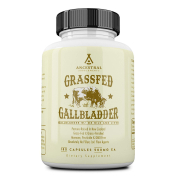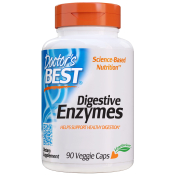Stomach
High in the abdominal cavity, just below the diaphragm, lies your stomach, a hollow organ with a J-shape. The stomach is part of the digestive system and plays a significant role in digesting food and in defending against microorganisms and bacteria that enter your body along with your food. Through muscle contractions that knead it, your stomach breaks down the food that enters it from your esophagus. Additionally, the stomach is where the initial digestion of proteins and fats takes place. Maintaining a normal acidity in the stomach is essential for a healthy stomach function. Stomach acid is necessary for the digestion and absorption of nutrients, as well as for defense against bacteria and other invaders that cannot survive the acidic gastric juice. If you feel the need, you can support your stomach, esophagus, intestines, or gallbladder with a variety of supplements, such as Rumen Gallbladder with Liver - Grass-Fed from Ancestral Supplements.
Anatomy of the Stomach
The stomach wall is approximately half a centimeter thick and consists of three layers: the muscular layer, the connective tissue layer, and the mucous membrane layer. The stomach's muscular layer is made up of smooth and striated muscle tissue, allowing the stomach to contract and expand. By employing peristaltic movements, your stomach effectively kneads and propels food towards the intestines. The connective tissue layer contains blood vessels that supply the stomach with oxygen and nutrients because the stomach not only processes nutrients but also requires them. In the innermost layer of the stomach wall, the mucous membrane layer, you can find glands responsible for producing gastric juice. Additionally, this layer acts as a protective barrier against stomach acid, which is so acidic that direct contact with stomach cells would cause damage.
Supporting Your Stomach and Digestion
The digestive system is a complex but well-organized system capable of withstanding various challenges. Each day, it processes the food that needs to be transported, broken down, and separated into useful, useless, and harmful substances. Moreover, it faces threats from external invaders. Many people aim to support their digestion and overall health through lifestyle changes or supplements. Fortunately, there's much you can do to maintain a healthy digestive system. Avoiding eating too quickly, overeating, consuming high-fat, spicy, or excessively hot foods, and maintaining regular meal times are helpful practices. Reducing stress, getting enough rest, and avoiding coffee, alcohol, tobacco, and spicy spices also contribute to a healthy digestive system.
Supplements, Stomach Acid, and Enzymes
Stomach acid has four crucial functions: pre-digesting fats, converting proteins into amino acids, splitting mineral compounds connected to amino acids, and facilitating the absorption of vitamin B12. It also serves to kill bacteria, fungi, and yeasts. Your stomach produces enzymes for the digestion of fats and proteins. Your body requires acetylcholine and histamine to produce stomach acid. It is essential that the quantity of stomach acid and enzymes in your stomach remains in balance. You can support your digestive system with supplements. For instance, stomach acid and enzymes may benefit from betaine, which contributes to normal homocysteine metabolism. Calcium also supports digestion. If you wish to support digestion with supplements or specifically target your stomach or stomach acid, consider products like Epinutra's Benesco™ Natural Reflux Lozenges, Smidge™ HCl + Enzymes (formerly GutZyme™ HCl) by Smidge™, or Doctor's Best Betaïne HCL & Pepsin.
Digestive Enzymes
Individuals looking to support stomach acid and enzymes through supplements often turn to products containing digestive enzymes. These enzymes are typically of plant and microbial origin and are commonly offered as a complex. Complexes combine enzymes from various sources to achieve greater biological activity. Digestive enzymes function as catalysts, accelerating specific and essential chemical reactions in the body. Without digestive enzymes, food processing would not be possible. The primary digestive enzyme in the human body is pancreatin, a blend of different enzymes produced by the pancreas. Trypsin and chymotrypsin are produced by the small intestine. Other significant digestive enzymes include hemicellulase, lactospore, papain, and rutin. An example of an enzyme complex offered by Ergomax is Smidge™ Digestive Enzymes, previously known as GutZyme™ by Seeking Health. Another uniquely formulated product is Doctor's Best Digestive Enzymes, containing a well-balanced spectrum of 16 high-quality digestive enzymes.


